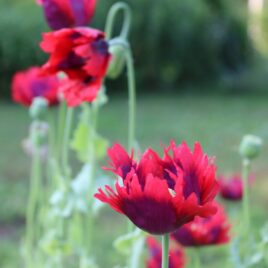Ornamental Edibles
Showing 13–24 of 27 results

Coriander/Cilantro – ‘Caribe’
Dense bunches of aromatic dark green leaves on long-standing, bolt-tolerant plants. A lovely cilantro with nice big meaty leaves, Caribe emphasizes bolt tolerance. It has a nice, fresh, difficult to describe, strong flavour. High yielding over an extended period of time. Plants produce flowers that are attractive to beneficial insects. We in this part of the world tend to call the leaves cilantro and the dried seeds coriander.
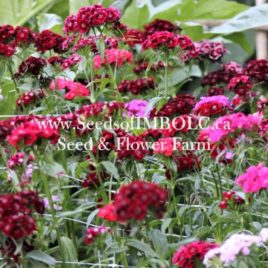
Dianthus – ‘Sweet William Mix’
(Dianthus Barbatus) So beautiful! The array of colours, including white, pink and bi-colour varieties are so charming! An irresistible, colourful, biennial, or short-lived perennial, flower with single or double blooms , blooming most profusely in the spring and summer. The plants require minimal care & give lovely, low-maintenance colour to borders, beds and containers. The flowers are edible and may have medicinal properties. Attracts bees, birds, and butterflies.
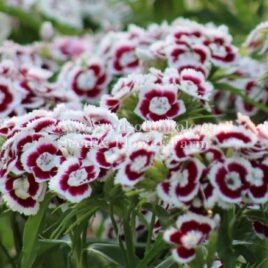
Dianthus ‘Holborn Glory’
(Dianthus Barbatus) An irresistible, colourful, biennial, or short-lived perennial, flower with single or double blooms , blooming most profusely in the spring and summer. The plants require minimal care & give lovely, low-maintenance colour to borders, beds and containers. The flowers are edible and may have medicinal properties. Attracts bees, birds, and butterflies.

Fennel ‘Bronze Leaf’
Foeniculum vulgare dulce 'Rubrum' this beautiful perennial plant is the host for the Swallowtail butterfly, is a long lasting, fragrant filler in bouquets, is edible, tasting like anise (leaves and seeds) and medicinal. What more could you ask for????!! Highly recommended as a long lasting unusual bouquet filler, similar in appearance to dill, its smokey bronze colour contrasting beautifully with the mustard yellow blooms. An aromatic herb that attracts beneficial insects!
If you follow Georgie Newbury at Common Farm Flowers in England you will know this is one of her favourites for filler too!
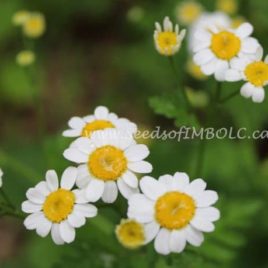
Feverfew -Matricaria
Matricaria, also known as feverfew, botanical name Tanacetum parthenium, is very cheerful, prolific branching flower, excellent as a filler in bouquets!
Long, strong stems that support abundant, 1/2–1" daisy like blooms with yellow disks and white petals. Easy to grow and harvest.
Feverfew is believed to aid digestion, and lower blood pressure. There is some scientific evidence that drinking feverfew tea, or adding a few fresh leaves leaves to a sandwich everyday, can for some people, reduce the frequency and severity of migraine headaches.
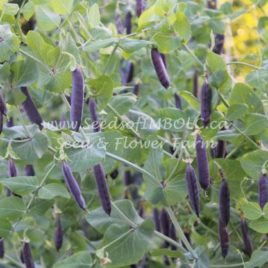
Pea – ‘Blue Pod Capucijners’
The Blue-podded Capucijner (cap-ou-SIGH-nah) is a hardy pea first grown by the Franciscan Capuchin monks. Its particularly beautiful, bi-colored flowers are lilac/pink and wine-red/purple, fading to blue as they wilt; pods are deep inky purple/blue. It is best used to make delicious, full-bodied soups; also an edible-podded sugar pea. Great long term storage food.
Soaring, vining plants are smothered in the most striking dark purple pea pods. A rich eggplant color, these shelling peas are as delicious as they are beautiful; pick early for best flavor. The vining stems make a wonderful and unexpected addition to summer flower arrangements and are a real conversation starter. A must grow heirloom.
Beautiful heirloom pea that is pretty enough to grow as an ornamental for the edible gardening fans, even if you don't like peas. The dark colored pods really stand out against the background of the bright green leaves making them very easy to pick. It is a good choice for children and the elderly.
Approximately 30 seeds per packet. (read more below)
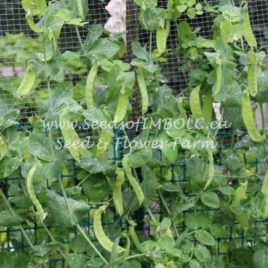
Pea – ‘Sumo’ Snow Pea
Pisum sativum (66 days) Open-pollinated. The Sumo cum laude of snow peas! Sumo is the best purple-flowered snow pea we’ve ever had. Its light lime-green pods are larger and fatter than Mammoth Melting Sugar’s and really sweet right off the vine as well as in stir-fries.
This amazing snow pea came to me via a Seeds of Diversity Grow out.They need to have seeds grown and returned to them to bulk up their seed bank and I get to keep a few and have now grown them out again to be able to offer some to you.
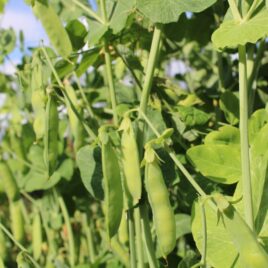
Pea ‘Amplissimo Viktoria Ukrainskaya’
Ukrainian heirloom
a.k.a. the "Garbanzo pea of the North"
A pea to substitute for climates where it is difficult to grow chickpeas because of short springs and hot summers. Makes delicious hummus, curries, you name it! These peas hold their shape after cooking just like chickpeas!
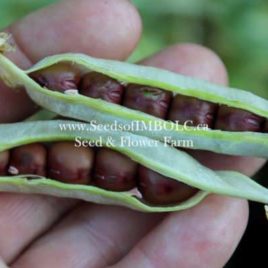
Pea ‘Swedish Red ‘
(Pisum sativum); aka Biskopens gråært, Bishop's Grey, Bishop's Greypea, Bishop's Red; Heirloom; Climbing pea; Dry pea;Scandinavian heirloom
These rare Scandinavian heirloom climbing peas are very tall and later flowering than my other varieties. Dry use. They bloom prolifically so great for use as tendrils, cut flowers and ornamental uses as well as totally edible! Unusual claret-coloured seeds turn chocolate brown on cooking.
see below for more info!
Approx 25 seeds
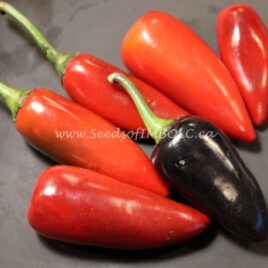
Pepper – Black Hungarian
(Capsicum annuum) Beautifully bold and decidedly sweet…
There’s a drama to the Hungarian black pepper that’s 100% its own. Its dark-hued skin turns to a rich jewel tone red as it ages, and it delivers a certain sweetness at maturity quite unlike other chilies in its heat range. This is a chili that fits both form and function, working beautifully as both an ornamental pepper and a culinary chili.
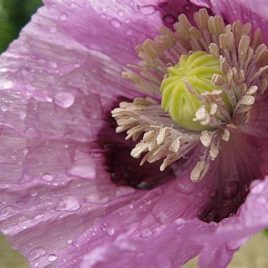
Poppy – Breadseed Poppy Mix
This mix is a colourful blend of reds, lavenders and others. Adds beauty and colour to your garden! The pods are excellent for dried crafts and dry or fresh for arrangements! Its seeds, which do not contain alkaloids, are widely used on breads, cakes, bagels and in Middle Eastern delicacies. The seeds also yield a good quality oil used for salads, soap, ointments and paints.
Approx 150 Seeds
